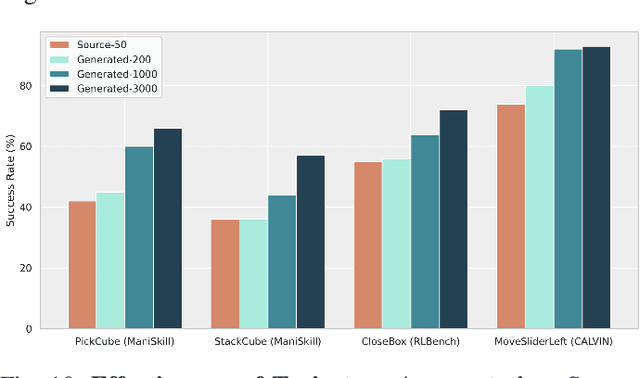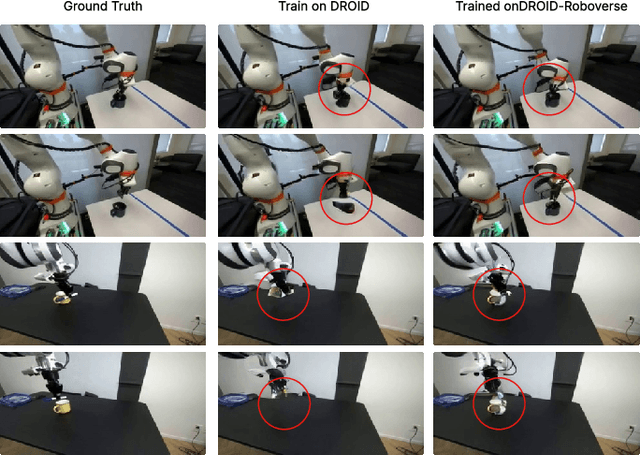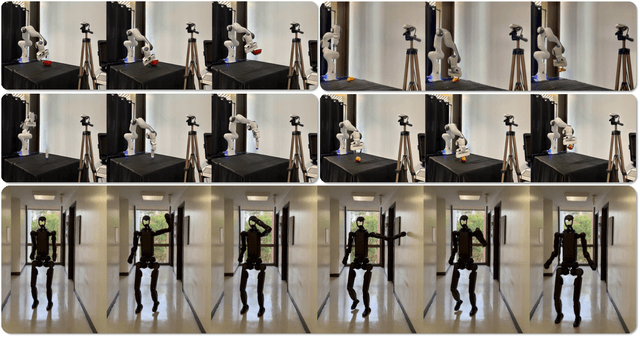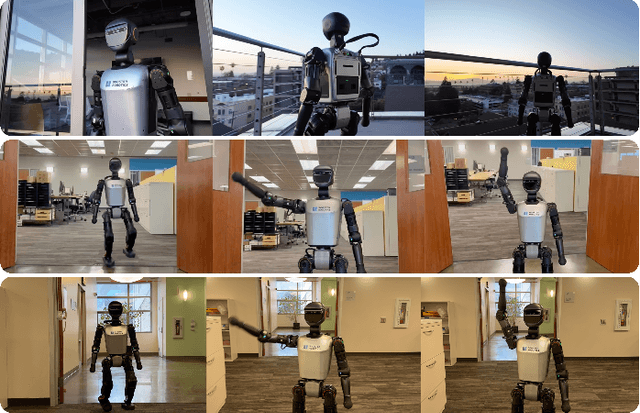Chaoyi Xu
Rethinking Visual-Language-Action Model Scaling: Alignment, Mixture, and Regularization
Feb 10, 2026Abstract:While Vision-Language-Action (VLA) models show strong promise for generalist robot control, it remains unclear whether -- and under what conditions -- the standard "scale data" recipe translates to robotics, where training data is inherently heterogeneous across embodiments, sensors, and action spaces. We present a systematic, controlled study of VLA scaling that revisits core training choices for pretraining across diverse robots. Using a representative VLA framework that combines a vision-language backbone with flow-matching, we ablate key design decisions under matched conditions and evaluate in extensive simulation and real-robot experiments. To improve the reliability of real-world results, we introduce a Grouped Blind Ensemble protocol that blinds operators to model identity and separates policy execution from outcome judgment, reducing experimenter bias. Our analysis targets three dimensions of VLA scaling. (1) Physical alignment: we show that a unified end-effector (EEF)-relative action representation is critical for robust cross-embodiment transfer. (2) Embodiment mixture: we find that naively pooling heterogeneous robot datasets often induces negative transfer rather than gains, underscoring the fragility of indiscriminate data scaling. (3) Training regularization: we observe that intuitive strategies, such as sensory dropout and multi-stage fine-tuning, do not consistently improve performance at scale. Together, this study challenge some common assumptions about embodied scaling and provide practical guidance for training large-scale VLA policies from diverse robotic data. Project website: https://research.beingbeyond.com/rethink_vla
Being-H0.5: Scaling Human-Centric Robot Learning for Cross-Embodiment Generalization
Jan 19, 2026Abstract:We introduce Being-H0.5, a foundational Vision-Language-Action (VLA) model designed for robust cross-embodiment generalization across diverse robotic platforms. While existing VLAs often struggle with morphological heterogeneity and data scarcity, we propose a human-centric learning paradigm that treats human interaction traces as a universal "mother tongue" for physical interaction. To support this, we present UniHand-2.0, the largest embodied pre-training recipe to date, comprising over 35,000 hours of multimodal data across 30 distinct robotic embodiments. Our approach introduces a Unified Action Space that maps heterogeneous robot controls into semantically aligned slots, enabling low-resource robots to bootstrap skills from human data and high-resource platforms. Built upon this human-centric foundation, we design a unified sequential modeling and multi-task pre-training paradigm to bridge human demonstrations and robotic execution. Architecturally, Being-H0.5 utilizes a Mixture-of-Transformers design featuring a novel Mixture-of-Flow (MoF) framework to decouple shared motor primitives from specialized embodiment-specific experts. Finally, to make cross-embodiment policies stable in the real world, we introduce Manifold-Preserving Gating for robustness under sensory shift and Universal Async Chunking to universalize chunked control across embodiments with different latency and control profiles. We empirically demonstrate that Being-H0.5 achieves state-of-the-art results on simulated benchmarks, such as LIBERO (98.9%) and RoboCasa (53.9%), while also exhibiting strong cross-embodiment capabilities on five robotic platforms.
UniTacHand: Unified Spatio-Tactile Representation for Human to Robotic Hand Skill Transfer
Dec 24, 2025Abstract:Tactile sensing is crucial for robotic hands to achieve human-level dexterous manipulation, especially in scenarios with visual occlusion. However, its application is often hindered by the difficulty of collecting large-scale real-world robotic tactile data. In this study, we propose to collect low-cost human manipulation data using haptic gloves for tactile-based robotic policy learning. The misalignment between human and robotic tactile data makes it challenging to transfer policies learned from human data to robots. To bridge this gap, we propose UniTacHand, a unified representation to align robotic tactile information captured by dexterous hands with human hand touch obtained from gloves. First, we project tactile signals from both human hands and robotic hands onto a morphologically consistent 2D surface space of the MANO hand model. This unification standardizes the heterogeneous data structures and inherently embeds the tactile signals with spatial context. Then, we introduce a contrastive learning method to align them into a unified latent space, trained on only 10 minutes of paired data from our data collection system. Our approach enables zero-shot tactile-based policy transfer from humans to a real robot, generalizing to objects unseen in the pre-training data. We also demonstrate that co-training on mixed data, including both human and robotic demonstrations via UniTacHand, yields better performance and data efficiency compared with using only robotic data. UniTacHand paves a path toward general, scalable, and data-efficient learning for tactile-based dexterous hands.
Universal Dexterous Functional Grasping via Demonstration-Editing Reinforcement Learning
Dec 15, 2025Abstract:Reinforcement learning (RL) has achieved great success in dexterous grasping, significantly improving grasp performance and generalization from simulation to the real world. However, fine-grained functional grasping, which is essential for downstream manipulation tasks, remains underexplored and faces several challenges: the complexity of specifying goals and reward functions for functional grasps across diverse objects, the difficulty of multi-task RL exploration, and the challenge of sim-to-real transfer. In this work, we propose DemoFunGrasp for universal dexterous functional grasping. We factorize functional grasping conditions into two complementary components - grasping style and affordance - and integrate them into an RL framework that can learn to grasp any object with any functional grasping condition. To address the multi-task optimization challenge, we leverage a single grasping demonstration and reformulate the RL problem as one-step demonstration editing, substantially enhancing sample efficiency and performance. Experimental results in both simulation and the real world show that DemoFunGrasp generalizes to unseen combinations of objects, affordances, and grasping styles, outperforming baselines in both success rate and functional grasping accuracy. In addition to strong sim-to-real capability, by incorporating a vision-language model (VLM) for planning, our system achieves autonomous instruction-following grasp execution.
DemoGrasp: Universal Dexterous Grasping from a Single Demonstration
Sep 26, 2025Abstract:Universal grasping with multi-fingered dexterous hands is a fundamental challenge in robotic manipulation. While recent approaches successfully learn closed-loop grasping policies using reinforcement learning (RL), the inherent difficulty of high-dimensional, long-horizon exploration necessitates complex reward and curriculum design, often resulting in suboptimal solutions across diverse objects. We propose DemoGrasp, a simple yet effective method for learning universal dexterous grasping. We start from a single successful demonstration trajectory of grasping a specific object and adapt to novel objects and poses by editing the robot actions in this trajectory: changing the wrist pose determines where to grasp, and changing the hand joint angles determines how to grasp. We formulate this trajectory editing as a single-step Markov Decision Process (MDP) and use RL to optimize a universal policy across hundreds of objects in parallel in simulation, with a simple reward consisting of a binary success term and a robot-table collision penalty. In simulation, DemoGrasp achieves a 95% success rate on DexGraspNet objects using the Shadow Hand, outperforming previous state-of-the-art methods. It also shows strong transferability, achieving an average success rate of 84.6% across diverse dexterous hand embodiments on six unseen object datasets, while being trained on only 175 objects. Through vision-based imitation learning, our policy successfully grasps 110 unseen real-world objects, including small, thin items. It generalizes to spatial, background, and lighting changes, supports both RGB and depth inputs, and extends to language-guided grasping in cluttered scenes.
RoboVerse: Towards a Unified Platform, Dataset and Benchmark for Scalable and Generalizable Robot Learning
Apr 26, 2025



Abstract:Data scaling and standardized evaluation benchmarks have driven significant advances in natural language processing and computer vision. However, robotics faces unique challenges in scaling data and establishing evaluation protocols. Collecting real-world data is resource-intensive and inefficient, while benchmarking in real-world scenarios remains highly complex. Synthetic data and simulation offer promising alternatives, yet existing efforts often fall short in data quality, diversity, and benchmark standardization. To address these challenges, we introduce RoboVerse, a comprehensive framework comprising a simulation platform, a synthetic dataset, and unified benchmarks. Our simulation platform supports multiple simulators and robotic embodiments, enabling seamless transitions between different environments. The synthetic dataset, featuring high-fidelity physics and photorealistic rendering, is constructed through multiple approaches. Additionally, we propose unified benchmarks for imitation learning and reinforcement learning, enabling evaluation across different levels of generalization. At the core of the simulation platform is MetaSim, an infrastructure that abstracts diverse simulation environments into a universal interface. It restructures existing simulation environments into a simulator-agnostic configuration system, as well as an API aligning different simulator functionalities, such as launching simulation environments, loading assets with initial states, stepping the physics engine, etc. This abstraction ensures interoperability and extensibility. Comprehensive experiments demonstrate that RoboVerse enhances the performance of imitation learning, reinforcement learning, world model learning, and sim-to-real transfer. These results validate the reliability of our dataset and benchmarks, establishing RoboVerse as a robust solution for advancing robot learning.
DyWA: Dynamics-adaptive World Action Model for Generalizable Non-prehensile Manipulation
Mar 21, 2025Abstract:Nonprehensile manipulation is crucial for handling objects that are too thin, large, or otherwise ungraspable in unstructured environments. While conventional planning-based approaches struggle with complex contact modeling, learning-based methods have recently emerged as a promising alternative. However, existing learning-based approaches face two major limitations: they heavily rely on multi-view cameras and precise pose tracking, and they fail to generalize across varying physical conditions, such as changes in object mass and table friction. To address these challenges, we propose the Dynamics-Adaptive World Action Model (DyWA), a novel framework that enhances action learning by jointly predicting future states while adapting to dynamics variations based on historical trajectories. By unifying the modeling of geometry, state, physics, and robot actions, DyWA enables more robust policy learning under partial observability. Compared to baselines, our method improves the success rate by 31.5% using only single-view point cloud observations in the simulation. Furthermore, DyWA achieves an average success rate of 68% in real-world experiments, demonstrating its ability to generalize across diverse object geometries, adapt to varying table friction, and robustness in challenging scenarios such as half-filled water bottles and slippery surfaces.
QuadWBG: Generalizable Quadrupedal Whole-Body Grasping
Nov 11, 2024



Abstract:Legged robots with advanced manipulation capabilities have the potential to significantly improve household duties and urban maintenance. Despite considerable progress in developing robust locomotion and precise manipulation methods, seamlessly integrating these into cohesive whole-body control for real-world applications remains challenging. In this paper, we present a modular framework for robust and generalizable whole-body loco-manipulation controller based on a single arm-mounted camera. By using reinforcement learning (RL), we enable a robust low-level policy for command execution over 5 dimensions (5D) and a grasp-aware high-level policy guided by a novel metric, Generalized Oriented Reachability Map (GORM). The proposed system achieves state-of-the-art one-time grasping accuracy of 89% in the real world, including challenging tasks such as grasping transparent objects. Through extensive simulations and real-world experiments, we demonstrate that our system can effectively manage a large workspace, from floor level to above body height, and perform diverse whole-body loco-manipulation tasks.
A Survey on Game Playing Agents and Large Models: Methods, Applications, and Challenges
Mar 15, 2024Abstract:The swift evolution of Large-scale Models (LMs), either language-focused or multi-modal, has garnered extensive attention in both academy and industry. But despite the surge in interest in this rapidly evolving area, there are scarce systematic reviews on their capabilities and potential in distinct impactful scenarios. This paper endeavours to help bridge this gap, offering a thorough examination of the current landscape of LM usage in regards to complex game playing scenarios and the challenges still open. Here, we seek to systematically review the existing architectures of LM-based Agents (LMAs) for games and summarize their commonalities, challenges, and any other insights. Furthermore, we present our perspective on promising future research avenues for the advancement of LMs in games. We hope to assist researchers in gaining a clear understanding of the field and to generate more interest in this highly impactful research direction. A corresponding resource, continuously updated, can be found in our GitHub repository.
GAMMA: Graspability-Aware Mobile MAnipulation Policy Learning based on Online Grasping Pose Fusion
Sep 27, 2023



Abstract:Mobile manipulation constitutes a fundamental task for robotic assistants and garners significant attention within the robotics community. A critical challenge inherent in mobile manipulation is the effective observation of the target while approaching it for grasping. In this work, we propose a graspability-aware mobile manipulation approach powered by an online grasping pose fusion framework that enables a temporally consistent grasping observation. Specifically, the predicted grasping poses are online organized to eliminate the redundant, outlier grasping poses, which can be encoded as a grasping pose observation state for reinforcement learning. Moreover, on-the-fly fusing the grasping poses enables a direct assessment of graspability, encompassing both the quantity and quality of grasping poses.
 Add to Chrome
Add to Chrome Add to Firefox
Add to Firefox Add to Edge
Add to Edge